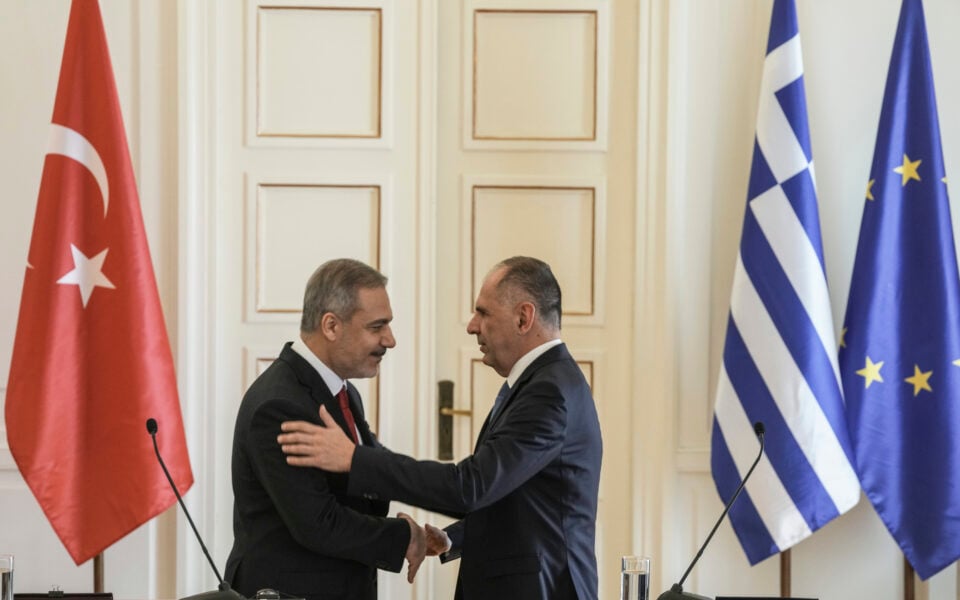
Greek Foreign Minister George Gerapetritis (right) and his Turkish counterpart Hakan Fidan thank each other at the end of a joint news conference, in Athens, on November 8, 2024. [Thanassis Stavrakis/AP]
The Greek state is characterized by inertia and inefficiency, with occasional shining exceptions. In contrast, abroad, and especially in the United States, radical technological growth and huge political changes are having a very significant impact on Greece and its geopolitical neighborhood. In this environment, it would be a euphemism to say that Greece has just been left behind in its foreign relations. It is more accurate to state that Greece very often receives blows/punches in its foreign relations. It is a tragedy that most of Greece’s diplomatic failures and defeats could have been avoided.
Unfortunately, Greece has a neighbor, Turkey, who wants to create a caliphate with the borders of the defunct Ottoman Empire. Turkey has conquered Syria and a significant part of Cyprus, militarily guided the taking of Nagorno-Karabakh, and has intervened militarily in Iraq, Kurdistan and Libya, while frequently threatening Greece, Israel, Egypt, Saudi Arabia, Armenia, and other countries. The fact that Turkey threatens almost all neighboring countries (and not only) provided Greece with an opportunity to coordinate with them to collectively and effectively confront the common threat. Instead, Greece did exactly the opposite. It responded with the “Athens Declaration” that declares the Turkish threats as minimal and declares the untruth that Turkey and Greece have only minimal differences.
The weekly declarations of President Recep Tayyip Erdogan that the Greek Aegean islands belong to Turkey were just ignored. This declaration has undermined the subsequent Greek efforts to persuade the EU and the US not to further arm Turkey, and the EU not to buy weapons from Turkey. America and the EU are understandably asking, “Why not?” since Greece has officially declared that its relations with Turkey are almost perfect.
Greece seems to be afraid of the current US administration and is attempting to “fly under the radar” so as not to be noticed and “get slapped” by President Donald Trump. Obviously it was a mistake of the Greek government to be close only to the Democrats during the election campaign. However, no matter what happened in the past, the Greek government must find ways to work harmoniously with the Trump administration. And clearly it is catastrophic for Greece to be voiceless or to “fly under the radar” while in such a sensitive and tense neighborhood.
What needs to be done?
First, the Greek Foreign Ministry needs to find its voice and start stating the Greek positions. By that I do not mean press announcements for domestic consumption such as “Justice is on our side” or “We are on the right side of history.” It needs to understand its audience abroad and not let the expansionist declarations of frenzied Erdogan go unanswered.
Second, Greece needs to hire professional lobbyists (not Greeks or Greek Americans) both in the US and in the EU to help promote the Greek positions in Congress, the White House, the press and mass media, the think tanks, the EU Commission, the European Parliament etc. Greek-American organizations do a good job, but they cannot replace the Greek state lobby. Furthermore, these organizations cannot work for Greece due to legal restrictions, and, in any case, have limited reach and power. The right solution is for them to work in parallel with the Greek state lobby, in a similar way to other ethnic organizations in the United States, with the prime example being the Jewish-American organizations. The creation and support of a Greek state lobby in the US and the support and expansion of the Greek-American organizations is of enormous importance to Greece, especially at this critical juncture and given the role of the US in the region.
Third, Greece must define its exclusive economic zone (EEZ) throughout Greek territory. The tough negotiations with Turkey (probably with American arbitration) are coming very soon. If Greece has not first defined its EEZ throughout the territory, it would be walking in the minefield of negotiations without a compass and without having its back covered. As long as the Greek EEZ and its borders with the Cypriot EEZ and Libya have not been defined, Turkey can obstruct every little action Greece takes, such as laying a cable near Kasos, as well as mining south of Crete.
Fourth, Greece, as the only Christian Orthodox state in the region, must ask for EU and US assistance in protecting the persecuted Orthodox Christians of the Middle East, and especially in Syria.
Fifth, let’s overcome procrastination and reach agreements even if they are not 100% what we want. We could have had agreements decades ago on defining the EEZ border with Libya and on the Monastery of Saint Catherine with Egypt. We did not do them, and we are now paying for our procrastination.
Sixth, Greece needs to invest in the Greeks of America so that they play a national role. The consulates only know those who registered with them – that is, very few. The contact of the Greek state with the diaspora is left to the goodwill of the consuls who have minimal staff and money or to bureaucratic mechanisms that hold meetings in Athens and Thessaloniki, but the Greeks of San Francisco or Atlanta have not even heard of them. The Greek diaspora needs cultural and political organizations to be able to play the national role that Greece asks for. The Greek Church in America, especially with the patriarch being hostage in Turkey, has significant limitations and, after all, this is not its job.
In closing, this article strongly suggests that the Ministry of Foreign Affairs comes out of hibernation and works hard on the pressing national issues. This is absolutely necessary in the current evolving circumstances.
Nicholas Economides is a professor at the Stern School of Business, New York University.